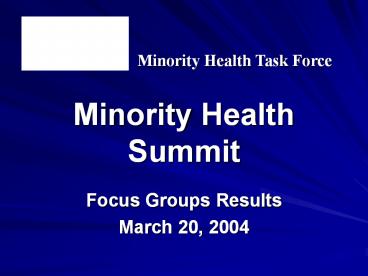Minority Health Summit PowerPoint PPT Presentation
1 / 25
Title: Minority Health Summit
1
Minority HealthSummit
Minority Health Task Force
- Focus Groups Results
- March 20, 2004
2
Overview
- History
- Goals
- Evidence
- Discussion
- Interactive Session
- Next Steps
3
History
- Healthy People 2000 and 2010
- February 2002--University of Pittsburghs Center
for Minority Health response to PA DOH planning
grant - October 2002--Health Disparity Leadership
Institute - January 2003--Task Force meets monthly
4
Goals
- Assess what are priority health issues
- Engage and support community to address health
issues
5
Evidence
- National
- State
- County
6
State Evidence
Figure 1. Average Annual Age-Adjusted Incidence
and Mortality Rates, All Cancer Sites, by Sex
and Race, Pennsylvania Residents,
1994-1998. per 100,000 1970 US standard million
population.
Source PA Department of Health, Online, Number
of Cases by Stage, Sex and Race, by County, 23
Selected Sites, 1990-1998
7
County Evidence
- Statistics
- Focus Groups
8
Statistics
- Cancer
- Prostate
- Female Breast
- Cervical
- Colon
"These data were provided by the Bureau of Health
Statistics and Research, Pennsylvania Department
of Health. The Department specifically disclaims
responsibility for any analyses, interpretations
or conclusions."
9
Prostate Cancer
Figure 1. Comparison Between Races on Percentage
of Early-Stage (in situ or local) and Late-Stage
(regional or distant) Diagnosis for Men with
Prostate Cancer in Washington County, from 1990
to 1998.
Source PA Department of Health, Online, Number
of Cases by Stage, Sex and Race, by County, 23
Selected Sites, 1990-1998
10
Female Breast Cancer
Figure 2. Comparison Between Races on Percentage
of Early-Stage (in situ or local) and Late-Stage
(regional or distant) Diagnosis for Women with
Breast Cancer in Washington County from 1990 to
1998.
Source PA Department of Health, Online, Number
of Cases by Stage, Sex and Race, by County, 23
Selected Sites, 1990-1998
11
Cervical Cancer
Figure 3. Comparison Between Races on Percentage
of Early-Stage (in situ or local) and Late-Stage
(regional or distant) Diagnosis for Women with
Cervical Cancer in Washington County, from 1990
to 1998.
Source PA Department of Health, Online, Number
of Cases by Stage, Sex and Race, by County, 23
Selected Sites, 1990-1998
12
Colon Cancer
Figure 4. Comparison Between Races on Percentage
of Early-Stage (in situ or local) and Late-Stage
(regional or distant) Diagnosis for Men with
Colon Cancer in Washington County, from 1990 to
1998.
Source PA Department of Health, Online, Number
of Cases by Stage, Sex and Race, by County, 23
Selected Sites, 1990-1998
13
Colon Cancer
Figure 5. Comparison Between Races on Percentage
of Early-Stage (in situ or local) and Late-Stage
(regional or distant) Diagnosis for Women with
Colon Cancer in Washington County, from 1990 to
1998.
Source PA Department of Health, Online, Number
of Cases by Stage, Sex and Race, by County, 23
Selected Sites, 1990-1998
14
Focus Groups
- Locations
- Methodology
- Results
15
Locations
- Canonsburg, PA
- Mt. Olive Baptist Church, 2-8-04
- Donora, PA
- First Baptist Church, 4-3-04
- Washington, PA
- Friendship Baptist Church, 2-15-04
- Nazareth Baptist Church, 2-22-04
- St. Paul AME Church, 8-16-03
16
Methodology
- Recruitment
- Member of congregation/task force recruited 6-8
people with a variety of ages - Guide
- 1. What do you consider to be the major health
issues confronting your community? - 2. What are the obstacles or barriers that keep
people in your community from getting the help
they need? - 3. What are some solutions that could help
address these barriers?
17
Results
- Priority Lists
- Barriers
- Solutions
18
Priority Lists
- Three of the four groups listed the following
issues - Diabetes
- Hypertension
- The following issues were listed by two of the
four groups - Cancer
- Drug/Alcohol Use
19
Priority Lists
- The following issues were listed by one of the
four groups - Health Insurance issues
- High cholesterol
- Exercise/Nutrition for adults and kids
- Accessible, available, and affordable health
care, programs, and facilities - STD (AIDS, sexual dysfunction)
- Mental Health (adult and youth, especially
depression and self-esteem) - Teen Pregnancy
20
Barriers
- Lack of education / knowledge / awareness / mixed
messages - Fear / lack of trust due to bad experiences
- Apathy / denial
- Community not involved
- Lack of resources (money health insurance)
- Identifying those at risk
21
Solutions
- Prayer
- Get involved
- More education programs then pass on to /
encourage others - Need local role models / advocates / spokespeople
22
Discussion
- Questions
- What do you think about the results?
23
Interactive Session
- Break into groups based on priority areas.
- For each priority area, discuss how to overcome
barriers and use solutions in suggested
activities. - Report out.
24
Next Steps
- Welcome additional members to task force
- Task force meets second Thursday of every month
from 500 P.M. to 630 P.M. at Presbyterian
SeniorCare - Develop Minority Health Task Force strategic plan
- List goals and objectives
- Create action plan to carry out
25
Thank you!
- Washington County Health Partners, Inc.190 N
Main St, Ste 208Washington, PA 15301(P)
724-222-6511(F) 724-222-6685(E) info_at_wchpinc.org

